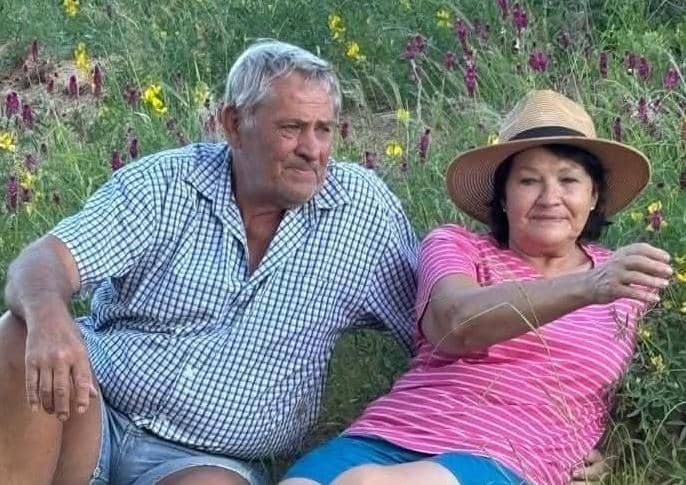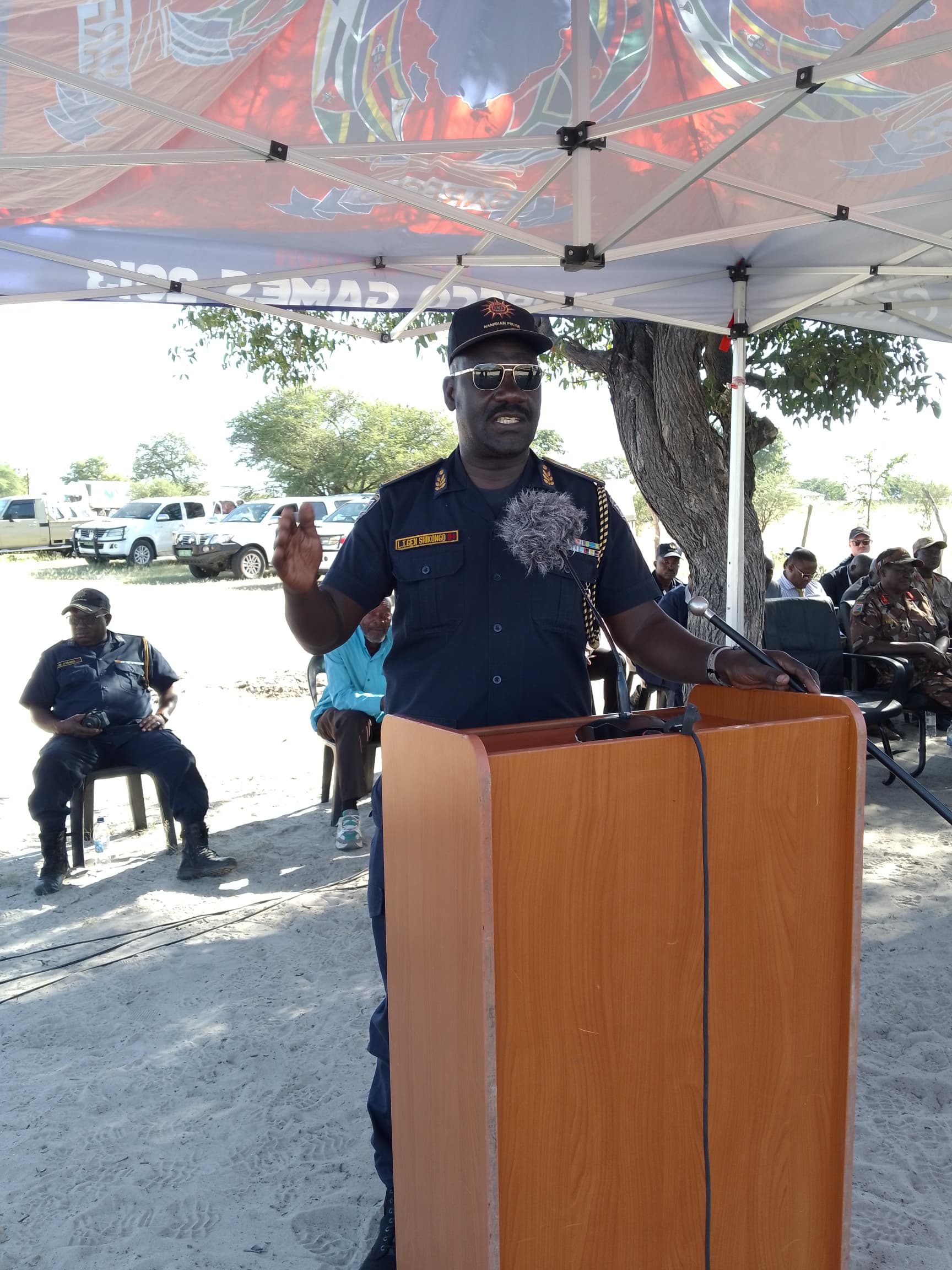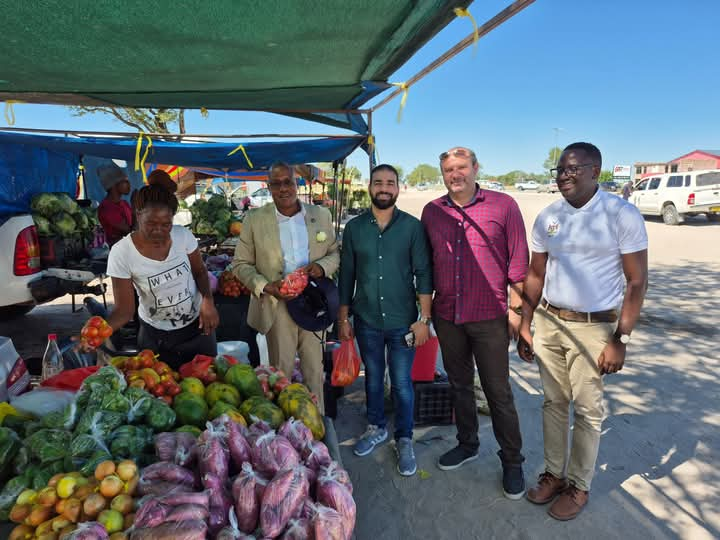THE rugged hilltops of the Khomas Hochland, with their crags and rivers, were the mould which formed Philemon Gawanab.
He spent his early years there, herding his father’s cattle, sheep and goats, and the places in and around what is now called ‘Daan Viljoen’ held a strong place in his heart and spirit until his death last week. Philemon was born in the settlement then called ‘//Khaos’ on June 24 1922, among 10 children of Jonas Naukhub Nowaseb and Tsutsu Gawanas.Through some agreement, the daughters took the father’s surname and Lutheran religion and the sons the mother’s surname and were brought up as Catholics.Jonas was a respected member of the /Khomanin, Damaras who lived in and were inspired by their mountains for centuries until they were forcibly resettled under apartheid removals of the Augeigas “black spot”, promised better farms and dumped onto desert fringes.His physical and personal strength was legendary – apparently he could carry a 200 litre drum of water without difficulty – and some of this passed on to Philemon.At the age of 11 or 12, Jonas passed away and Philemon’s elder brother, Gerhard, brought him to live at the Roman Catholic mission in the Old Location and study at its school.He soon developed a passion for the Gospel that fired him his whole life and by age 16 or 17 was regularly travelling with Father Qwinkler to evangelise people on the Khomas Hochland farms and bring them education and other aid.The church probably started his love of the trumpet which became the feature by which neighbours and visitors knew him, or sometimes as a trio with brothers Harob on violin and Gerhard on piano.His work career started with Windhoek Karakul Exporters, first assisting and eventually buying karakul sheepskins from farmers for export, travelling also to South Africa.Philemon loved travelling and adventure and, while still a teenager, decided to join the army during the Second World War.Training was in Lens, Kliptown, in South Africa, (near Pretoria) and the unit did a first tour of duty at Suez Canal.While training in South Africa he broke an arm working an artillery gun and tried to hide it so he could get back to Suez.The pain was too great and eventually he was discharged.Philemon returned to the Old Location and started businesses.First he was a motor mechanic, repairing cars and eventually trucks.He had a shop and also traded (“smous”) in the farms on the Khomas mountains.He established a garage and a filling station and built the first brick house in the Old Location, between the current site of Emma Hoogenhout school and Hosea Kutako Drive.In his travels, he found a vision in the Khan riverbed in Usakos.His love and devotion to the beautiful young Hilde Rheiss endured his whole life.At first her parents were not impressed with the worldly older man.Younger brother, Harob, ever the politician, was sent to put Philemon’s case.The family relented and Hilde and Philemon married on February 9 1954.Their firstborn, Jacka, was born in 1950 and children followed exactly every two years: Laurentia, Gawie, Bience (her second name is Philomina), Bambi, Lucky, Bianca, Babsy, Greg, until Clive in 1968 and later Norman.Philemon and Hilde also looked after his brothers’ and sisters’ children and sent them to school.He was a steadfast disciplinarian, a good provider and a deacon and church elder for many years.Philemon called himself ‘Houmoed’, or ‘Keep Courage’.He had frequent run-ins with authority as he was generous financially and otherwise in support of resistance politicians, allowed meetings in his house and sold illicit home brew.Like the mountains, he refused to be told what to do, and sometimes thunder and lightning erupted as he physically fought apartheid officials as they tried to put eviction notices on his house and businesses.Police raids on the family home became frequent.Bulldozers can damage even the Khomas mountains.The family, down to one-year-old Clive, rushed outside and watched in shock in 1969 as their furniture was loaded into trucks and bulldozers smashed their home to rubble.The last houses in the Old Location were those of Philemon and Harob.By refusing deadlines, they lost all chance of compensation for the businesses built through years of work.Furniture was dumped on an open plot outside the two bedroom house at OD 10/27 in Katutura, which remained home for all 10 children and their parents.Harob refused to move into any home in Katutura (“the place we will not stay”), and lived out of a car for some years before leaving for Otjimbingwe.Philemon Houmoed started to rebuild his shattered life and resumed trading in the Khomas Hochland.Under the Odendaal Plan, he was allotted a dry farm of desert rocks near the Spitzkoppe, then called ‘Nels Rus’, which he renamed ‘Houmoed’s Rus’.He and Hilde brought the cattle, sheep and goats they had accumulated.The family would head out in one of Philemon’s trucks and often spent whole school holidays there, breaking horses, working, having fun, telling stories or playing pranks on tourists.Whenever the borehole was working, people from miles around would bring their thirsty animals and destroy the few blades of grass available, but Philemon could not refuse them.Despite the farm’s name, apartheid and the increasing violence and hatred would deny Houmoed any rest from a fateful day in 1974.His beloved eldest son and right hand, Jacka, was driving with him to Usakos on 13 October when the car broke down.His father allowed him to take a lift with white men to get help.When the body was found later, beaten and burnt some distance from the road, the police refused to investigate, saying it was a “traffic accident”.Philemon always blamed himself.The tragedy inspired Bience, then 18 and in high school, to become a lawyer and fight the system that allowed such injustice.Philemon’s funeral will mark the 33rd anniversary of Jacka’s murder.Laurentia died in 1976, politics forced Bience into exile in 1977 and Bambi died in a shooting accident in 1981.Gradually Philemon’s external strength started to erode and he lost his passion for driving to the farm, then for other businesses, and turned to drinking and violent moods.Hilde divorced him and took the family to Nozimanga, still the family seat at D37/15, Katutura.Ever Roman Catholic, Philemon always refused to accept the divorce.Philemon gradually retreated into a solitary life, eventually building himself a rough shelter of bricks on the back of his house.The children had to break it apart to get him to move, and from the early 1990s he lived with his grandson Dennis, son Lucky and daughters, Babsie or Gawie, and their families.Eventually he did not have enough breath to blow the trumpet.Greg’s death, in a road accident in 1998, only further numbed him but he remained deeply spiritual, although disillusioned with changes in the Catholic church, and also very aware of his ancestral heritage.The day before he passed, Philemon asked for forgiveness, saying he was about to go.The next day, October 3, he asked people to leave him alone and died peacefully on his bed.He left behind his sister Justine, Hilde and nine sons and daughters, as well as many grandchildren and great-grandchildren.No doubt Houmoed’s spirit spent some sunlit and twilight hours with the ancestors in the old haunts around //Khaos in the mountains, before passing on to a better place.Philemon was born in the settlement then called ‘//Khaos’ on June 24 1922, among 10 children of Jonas Naukhub Nowaseb and Tsutsu Gawanas.Through some agreement, the daughters took the father’s surname and Lutheran religion and the sons the mother’s surname and were brought up as Catholics.Jonas was a respected member of the /Khomanin, Damaras who lived in and were inspired by their mountains for centuries until they were forcibly resettled under apartheid removals of the Augeigas “black spot”, promised better farms and dumped onto desert fringes.His physical and personal strength was legendary – apparently he could carry a 200 litre drum of water without difficulty – and some of this passed on to Philemon.At the age of 11 or 12, Jonas passed away and Philemon’s elder brother, Gerhard, brought him to live at the Roman Catholic mission in the Old Location and study at its school.He soon developed a passion for the Gospel that fired him his whole life and by age 16 or 17 was regularly travelling with Father Qwinkler to evangelise people on the Khomas Hochland farms and bring them education and other aid.The church probably started his love of the trumpet which became the feature by which neighbours and visitors knew him, or sometimes as a trio with brothers Harob on violin and Gerhard on piano.His work career started with Windhoek Karakul Exporters, first assisting and eventually buying karakul sheepskins from farmers for export, travelling also to South Africa.Philemon loved travelling and adventure and, while still a teenager, decided to join the army during the Second World War.Training was in Lens, Kliptown, in South Africa, (near Pretoria) and the unit did a first tour of duty at Suez Canal.While training in South Africa he broke an arm working an artillery gun and tried to hide it so he could get back to Suez.The pain was too great and eventually he was discharged.Philemon returned to the Old Location and started businesses.First he was a motor mechanic, repairing cars and eventually trucks.He had a shop and also traded (“smous”) in the farms on the Khomas mountains.He established a garage and a filling station and built the first brick house in the Old Location, between the current site of Emma Hoogenhout school and Hosea Kutako Drive.In his travels, he found a vision in the Khan riverbed in Usakos.His love and devotion to the beautiful young Hilde Rheiss endured his whole life.At first her parents were not impressed with the worldly older man.Younger brother, Harob, ever the politician, was sent to put Philemon’s case.The family relented and Hilde and Philemon married on February 9 1954.Their firstborn, Jacka, was born in 1950 and children followed exactly every two years: Laurentia, Gawie, Bience (her second name is Philomina), Bambi, Lucky, Bianca, Babsy, Greg, until Clive in 1968 and later Norman.Philemon and Hilde also looked after his brothers’ and sisters’ children and sent them to school.He was a steadfast disciplinarian, a good provider and a deacon and church elder for many years.Philemon called himself ‘Houmoed’, or ‘Keep Courage’.He had frequent run-ins with authority as he was generous financially and otherwise in support of resistance politicians, allowed meetings in his house and sold illicit home brew.Like the mountains, he refused to be told what to do, and sometimes thunder and lightning erupted as he physically fought apartheid officials as they tried to put eviction notices on his house and businesses.Police raids on the family home became frequent.Bulldozers can damage even the Khomas mountains.The family, down to one-year-old Clive, rushed outside and watched in shock in 1969 as their furniture was loaded into trucks and bulldozers smashed their home to rubble.The last houses in the Old Location were those of Philemon and Harob.By refusing deadlines, they lost all chance of compensation for the businesses built through years of work.Furniture was dumped on an open plot outside the two bedroom house at OD 10/27 in Katutura, which remained home for all 10 children and their parents.Harob refused to move into any home in Katutura (“the place we will not stay”), and lived out of a car for some years before leaving for Otjimbingwe.Philemon Houmoed started to rebuild his shattered life and resumed trading in the Khomas Hochland.Under the Odendaal Plan, he was allotted a dry farm of desert rocks near the Spitzkoppe, then called ‘Nels Rus’, which he renamed ‘Houmoed’s Rus’.He and Hilde brought the cattle, sheep and goats they had accumulated.The family would head out in one of Philemon’s trucks and often spent whole school holidays there, breaking horses, working, having fun, telling stories or playing pranks on tourists.Whenever the borehole was working, people from miles around would bring their thirsty animals and destroy the few blades of grass available, but Philemon could not refuse them.Despite the farm’s name, apartheid and the increasing violence and hatred would deny Houmoed any rest from a fateful day in 1974.His beloved eldest son and right hand, Jacka, was driving with him to Usakos on 13 October when the car broke down.His father allowed him to take a lift with white men to get help.When the body was found later, beaten and burnt some distance from the road, the police refused to investigate, saying it was a “traffic accident”.Philemon always blamed himself.The tragedy inspired Bience, then 18 and in high school, to become a lawyer and fight the system that allowed such injustice.Philemon’s funeral will mark the 33rd anniversary of Jacka’s murder.Laurentia died in 1976, politics forced Bience into exile in 1977 and Bambi died in a shooting accident in 1981.Gradually Philemon’s external strength started to erode and he lost his passion for driving to the farm, then for other businesses, and turned to drinking and violent moods.Hilde divorced him and took the family to Nozimanga, still the family seat at D37/15, Katutura.Ever Roman Catholic, Philemon always refused to accept the divorce.Philemon gradually retreated into a solitary life, eventually building himself a rough shelter of bricks on the back of his house.The children had to break it apart to get him to move, and from the early 1990s he lived with his grandson Dennis, son Lucky and daughters, Babsie or Gawie, and their families.Eventually he did not have enough breath to blow the trumpet.Greg’s death, in a road accident in 1998, only further numbed him but he remained deeply spiritual, although disillusioned with changes in the Catholic church, and also very aware of his ancestral heritage.The day before he passed, Philemon asked for forgiveness, saying he was about to go.The next day, October 3, he asked people to leave him alone and died peacefully on his bed.He left behind his sister Justine, Hilde and nine sons and daughters, as well as many grandchildren and great-grandchildren.No doubt Houmoed’s spirit spent some sunlit and twilight hours with the ancestors in the old haunts around //Khaos in the mountains, before passing on to a better place.
Stay informed with The Namibian – your source for credible journalism. Get in-depth reporting and opinions for
only N$85 a month. Invest in journalism, invest in democracy –
Subscribe Now!










